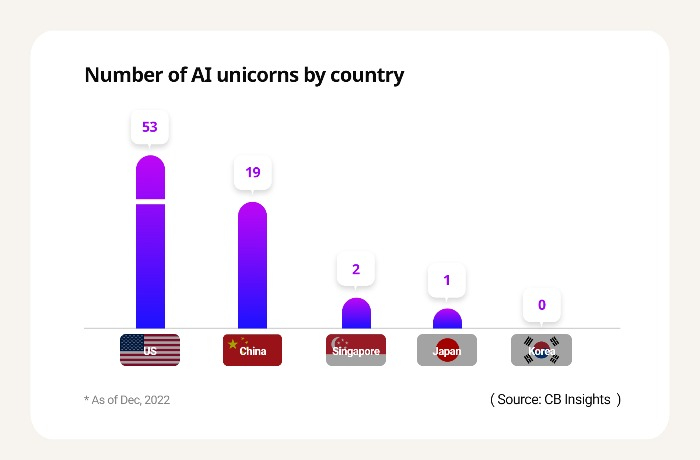Artificial intelligence
S.Korea behind in ChatGPT race with zero AI unicorns
Regulations and petty investment prevent South Korea from producing AI unicorn startups
By Feb 07, 2023 (Gmt+09:00)
3
Min read
Most Read
LG Chem to sell water filter business to Glenwood PE for $692 million


KT&G eyes overseas M&A after rejecting activist fund's offer


Kyobo Life poised to buy Japan’s SBI Group-owned savings bank


StockX in merger talks with Naver’s online reseller Kream


Meritz backs half of ex-manager’s $210 mn hedge fund



South Korea, one of the most wired countries in the world, lags far behind other countries in attaining unicorn startups in the artificial intelligence (AI) sector due to strict regulations on data collection and scarce investment, raising concerns the country may lose the latest AI arms race accelerated by ChatGPT.
According to global technology market tracker CB Insights on Monday, the US tops in the number of AI unicorns as of December 2022, with 53 startups including Scale AI Inc. China seals second place with 19, followed by the UK with 4.
But Korea has zero billion-dollar AI startup, while even Israel with a smaller gross domestic product (GDP) than Korea has three.
Regulations on data collection in the country are largely blamed for the lack of AI unicorn startups in Asia’s fourth-largest economy.
The country in 2020 passed the revision bills of three major data privacy laws to ease regulations on the use of personal information, but regulations on data use in the country are still stricter than those in other countries, preventing startups from collecting large enough data in Korea to run the rapidly advanced AI language.
The country also lacks investment in AI technology from both the government and the private sector.
According to the AI Index 2022 released by Stanford University’s Human-Centered Artificial Intelligence, investment in Korean startups amounted to $1.1 billion, a mere 2% of $52.9 billion worth investment in US startups. Israel attracted $2.4 billion.

Korean companies are not AI-friendly in general, said Lee Young-bok, founder and chief executive officer (CEO) of Genesis Lab Inc., adding that the government or public organizations should become more active in adopting AI technology. Genesis Lab is a Korean machine-learning technology developer that specializes in interactive AI technology.
The lack of AI investment could threaten the future of Korea’s hyperscale AI technology development, which is becoming increasingly important in the global AI arms race heated up by ChatGPT following the release of OpenAI’s GPT-3-based chatbot.
US, CHINA AT THE FOREFRONT
The US and China are the front runners in the development of hyperscale AI technology thanks to generous financial aid from the government and the private sector.
US government-led National Artificial Intelligence Research Resource Task Force will spend $2.6 billion over six years to build AI research infrastructure for public use.
The US government’s aids create greater synergy with the private sector’s massive investments in AI technology development. Microsoft Corp. recently pledged a $10 billion investment in OpenAI.
China has also poured billions of dollars into local AI technology development. Baidu Inc. is chosen by Beijing as a leading innovative AI company and has been enjoying various aids from the government. The country has earmarked about 13.8 billion yuan ($2 billion) to build a national technology park dedicated to the development of AI technology.

KOREA’S NATIONAL AI STRATEGY
Korea is also one of the countries that have joined the early race for hyperscale AI development. Korean IT giants Naver Corp. and Kakao Corp. as well as leading mobile carrier KT Corp. and LG Group have heavily invested in the development of the multimodal AI model with enhanced text and image detection technology.
The Korean government in 2019 vowed to spend 260 billion won ($27.3 million) over five years to secure machine learning data. This is stingy compared with what the US and China are injecting to win the AI race.
“Only a handful of big companies (in Korea) with related infrastructure develop hyperscale AI technologies,” said Kim Gun-hee, associate professor of the Department of Computer Science and Engineering at Seoul National University. “The (Korean) government should give companies more generous aids that are much bigger than now.”
Write to Joo-Wan Kim and Da Eun Choi at kjwan@hankyung.com
Sookyung Seo edited this article.
More to Read
-
 Artificial intelligenceKT unveils AI strategy, including hyperscale AI commercialization
Artificial intelligenceKT unveils AI strategy, including hyperscale AI commercializationNov 16, 2022 (Gmt+09:00)
1 Min read -
 Artificial intelligenceLG AI Research forms 'Hyperscale' AI alliance with 13 companies
Artificial intelligenceLG AI Research forms 'Hyperscale' AI alliance with 13 companiesFeb 23, 2022 (Gmt+09:00)
4 Min read -
 Artificial intelligenceKT to commercialize hyperscale AI model by H1 2022
Artificial intelligenceKT to commercialize hyperscale AI model by H1 2022Sep 03, 2021 (Gmt+09:00)
2 Min read
Comment 0
LOG IN


